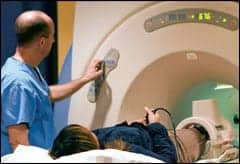|
|
Local, State, Federal |
ACR Speaks Out on GAO Report
Disagreeing with the Government Accountability Office’s recommendations for prior authorization by radiology benefits managers, the American College of Radiology recently contended that the process would take medical decisions out of the hands of physicians and may delay, or even deny, lifesaving imaging care. The college expressed concern over the longer waiting times that patients would likely endure in order to receive care.
“Why spend more taxpayer dollars to hire outside entities to examine claims on an individual basis, possibly delaying legitimate exams?” said James H. Thrall, MD, FACR, chair of the ACR Board of Chancellors. “Concerns regarding image quality, safety, and costs should be dealt with directly, not through a third party that will only add more administrative burden on providers.”

|

|
| The ACR is pushing for mandatory accreditation for all providers of advanced imaging rather than prior authorization. |
Upon review of the GAO’s report on imaging growth, the American College of Radiology did agree with the report’s concerns regarding the cost, quality, and safety of imaging services. Moreover, the ACR, like GAO, said it believed that financial incentives for physicians are a primary driver for the dramatic and costly growth of in-office imaging.
Yet, as an alternative to prior authorizations by radiology benefit management companies, the ACR has been advocating for mandatory accreditation for all providers of advanced imaging services. It also supports a demonstration project that will test the use of physician-developed appropriateness criteria. According to the college, these provisions, included in the recently passed Medicare Improvements for Patients and Providers Act of 2008, are “crucial first steps in dealing with the quality, safety, and cost of imaging services.”
While the ACR says that the Mammography Quality Standards Act has raised the quality of mammograms, it points out that there are no federally mandated quality and safety standards for providers of high-tech imaging services, such as MRI, CT, or PET scans.
“ACR accreditation would ensure that the physicians supervising and interpreting medical imaging meet stringent education and training standards, that the imaging equipment is surveyed regularly by qualified medical physicists to ensure that it is functioning properly, and that the technologists administering the tests are appropriately certified,” the college stated.
Serving as a guide for physicians to prescribe the most appropriate imaging exam for more than 200 clinical conditions, ACR Appropriateness Criteria may help address the GAO Report finding that identified the lack of training of many nonradiologists, the college continued. The ACR added that it regularly reaches out to other medical specialties, promoting awareness of the resourceful tool and encouraging its utilization.
“While the ACR certainly supports efforts to reduce the number of unnecessary imaging exams performed in the in-office setting and raise the quality of care provided to patients, the college maintains that the issue should be dealt with directly,” Thrall said. “Decisions should not be taken out of the hands of physicians. Instead, direct financial incentives for physicians to order more in-office scans should be removed, and quality and safety standards should be instituted to provide for uniform, quality care nationwide.”






